Drew Myron's Blog, page 18
December 1, 2020
Fast Five with Penelope Scambly Schott

"I believe that every person has a true landscape of the soul and that some of us are lucky enough to find that place.”
— Penelope Scambly Schott
Welcome to Fast Five, in which I ask my favorite writers five questions as a way to open the door to know more.
Penelope Scambly Schott is the author of over a dozen poetry books, a novel, and a “slightly fictional canine memoir.” She has earned an Oregon Book Award and numerous other literary achievements. She splits her time between two Oregon towns: the city of Portland to the west, and the small farm town of Dufur to the east.
1.
Let’s start with your most pressing and poetic theme: Dufur, Oregon.
I have a love affair with the small (population: 623) central Oregon town of Dufur. I’ve had my house here for ten years and each year I become more attached to the community. (I’ve bought a plot in the local cemetery so that even though I wasn’t born here I can be dead here.) I’ve published a chapbook called Lovesong for Dufur and, just this spring, On Dufur Hill, a full-length collection of poems about the cycle of a year here.

[ Read excerpts from On Dufur Hill here.]
I believe that every person has a true landscape of the soul — be it beach, mountains, whatever — and that some of us are lucky enough to find that place. I grew up in New York City as a free range child (remember those?) but have never again felt so at home as I do here. When local kids see me walking with my dog Sophia they yell out, “Hi, Penelope,” and when the dog and I step into the post office past the “No Dogs Allowed” sign, Sophia stands up at the counter and Dave or Mike will give her a biscuit.
2.
Why write?
Because I can’t help it? Because when I was a tiny child just learning to speak I stood up in my crib and spoke sentences? Because it’s too lonesome to have words in my mind that I can’t share? I could say that I write, as in putting the words on paper, because, unlike Homer and other bards, my memory isn’t good enough to compose and recite without a crib sheet. And that’s not just a joke; I am obsessed with the sounds of language. Most of my poems originate with a line or two coming into my head as I am out walking, usually climbing Dufur Hill which I do every morning. Something about the rhythm of walking triggers spoken language. I repeat the line or lines all the way down the hill and then when I get home I write them down and continue with the rest of the poem. Maybe writing is my way of coping with noticing and feeling.
3.
Tell us about your professional life. What do you enjoy about teaching?
I got my Ph.D. as a union card. I was a single mother with two kids and I had to do something to feed them. It was only when I started teaching that I discovered I actually liked it. I like: figuring something out clearly enough to explain it, learning from my students, making an emotional connection with each student, hoping I am useful. What I especially like about leading poetry workshops is how quickly we become a community.
On my resume I’ve been a college professor and a workshop leader, but for many years I also had jobs on the side. I worked as an artist’s model which taught me a lot about art and also that a body is just a thing. The most meaningful non-teaching job I’ve had was the five years I worked as a home health aide. I had felt I needed to learn more about old age and dying, and I sure did. Although I was treated with more respect as Professor Schott, I may have been more useful as “the girl from the agency.”
4.
Which non-literary piece of culture — film, tv show, painting, song — has influenced you?
I grew up without a television and never learned to watch. I see very few movies. The songs that have been important to me are not popular music but old Scottish ballads. Perhaps the biggest influence on me was the art I saw as a child when my mother took me regularly to the Museum of Modern Art in Manhattan. I remember being completely freaked out by Picasso’s painting Guernica showing the consequences of war. I can still hear that horse screaming. I was also greatly affected by a Giacometti sculpture called The Palace at 4 a.m. which was full of inexplicable mystery. I think I could trace much of my writing to those two pieces of art.
5.
Is there a book you wish you had written?
When I was a girl that book was Frances Hodgson Burnett’s The Secret Garden for its discovery of the unknown. Now it might be any of the poets who write very short and unforgettable gems — maybe some of the Chinese poets of the Tang dynasty or the wonderful one-line pieces by the Greek poet Yannis Ritsos as translated by my friend Paul Merchant in Monochords.
Bonus Question: What are your favorite words?
Almost anything with a B or a P or a K. I love making those sounds.
Poke, kitchen, spit, slump, noncombustible.
Of course there are also wonderful words like interrogatory and flat.
Hey, I guess I love ‘em all.
October 31, 2020
Nugget
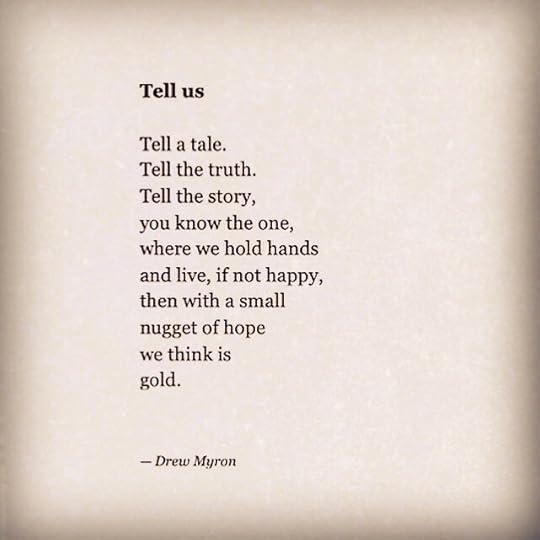
Hello Friend,
This is just to say hello & hold on.
With love,
Drew
October 24, 2020
Stretched & Choosing
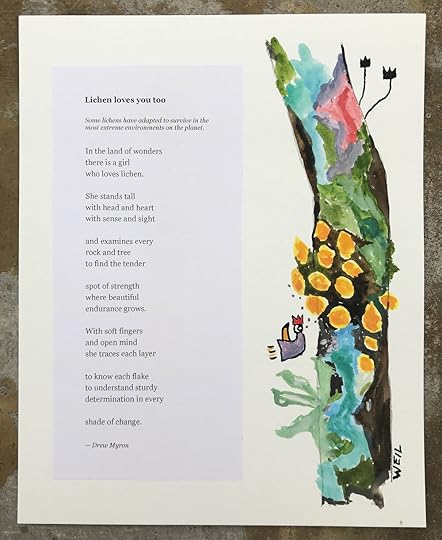
An art-poem by Tracy Weil and Drew Myron — made with love for a friend who loves lichen & life.
A friend is sick.
A mother ill.
A funeral today, another tomorrow.
Business lags.
Is this cold or flu or worse?
Where’s my ballot?
I have a litany of worries (don’t we all)? When I tell a friend, she is warm and wise in her response:
The heart stretches and stretches and stretches.
And I think of Maria Popova, the force behind Brain Pickings. Each year she distills one thing she’s learned about living while reading and writing her way through life. This year, she says, the challenge has been “colossal.”
“Depression,” she says, “has lowered its leaden cloudscape over me again and again since I was fifteen, but no other year has lidded life more ominously, as the staggering collective grief we are living through together densified the black fog of private loss.
In such seasons of life, one is pressed against the limits of one’s being, pressed eventually against the understanding — no, more than understanding and less than understanding: the blind elemental fact — that no matter the outer atmosphere of circumstance, one must lift the inner cloudscape by one’s own efforts, or perish under it.”
What did she learn this year? To choose joy — not as sappy platitude, but as intellectual and emotional survival:
“Choose joy. Choose it like a child chooses the shoe to put on the right foot, the crayon to paint a sky. Choose it at first consciously, effortfully, pressing against the weight of a world heavy with reasons for sorrow, restless with need for action. Feel the sorrow, take the action, but keep pressing the weight of joy against it all, until it becomes mindless, automated, like gravity pulling the stream down its course; until it becomes an inner law of nature. . . . “
Read the whole beautiful, essential passage here.
And so we keep weighing and stretching.
Please, dear reader, keep on choosing.
So few grains of happiness
measured against all the dark
and still the scales balance.
— Jane Hirshfield
from The Weighing
October 17, 2020
How does it feel to be able to breathe?
Hello Reader.
I’m weary. Are you too? I want to burrow in, head down, until this ugly season passes. But though I’m tired, I’m even more tired of feeling powerless. I’m sharing this video with you because words have power, music moves, and art transforms.
Please keep on.
With love,
Drew
Commander in Chief
Were you ever taught when you were young
If you mess with things selfishly, they're bound to come undone?
I'm not the only one
That's been affected and resented every story you've spun
And I'm a lucky one
'Cause there are people worse off that have suffered enough
Haven't they suffered enough?
But you can't get enough of
Shuttin' down systеms for personal gain
Fightin' fires with flyers and prayin' for rain
Do you gеt off on pain?
We're not pawns in your game
Commander in Chief, honestly
If I did the things you do
I couldn't sleep, seriously
Do you even know the truth?
We're in a state of crisis, people are dyin'
While you line your pockets deep
Commander in Chief, how does it feel to still
Be able to breathe?
We were taught when we were young
If we fight for what's right, there won't be justice for just some
Won't give up, stand our ground
We'll be in the streets while you're bunkering down
Loud and proud, best believe
We'll still take a knee while you're
Commander in Chief, honestly
If I did the things you do
I couldn't sleep, seriously
Do you even know the truth?
We're in a state of crisis, people are dyin'
While you line your pockets deep
Commander in Chief, how does it feel to still
Be able to breathe, breathe?
Be able to breathe
Won't give up, stand our ground
We'll be in the streets while you're bunkering down
Won't give up, stand our ground
We'll be in the streets while you're
Commander in Chief, honestly
If I did the things you do
I couldn't sleep, seriously
Do you even know the truth?
We're in a state of crisis, people are dyin'
While you line your pockets deep
Commander in Chief, how does it feel to still
Be able to breathe?
Able to breathe
— Demi Lovato
Commander in Chief
October 15, 2020
Fortune Found (by mistake)

Sometimes you stumble upon a book and the discovery is delight.
Rotten Perfect Mouth is a wonderful surprise.
I was watching I’m Thinking of Ending Things (Netflix) — a fantastic mindbender of a movie, based on a book, that deserves more attention — that includes a stellar performance of the poem, Bonedog.
When I googled the poem, everyone says Bonedog appears in the book Rotten Perfect Mouth. It doesn’t. But that’s okay because I now have a new-to-me book of poems by a poet I’m digging, and I’ll continue my search for the elusive poem that kicked off a hunt that led to the discovery.
(In the meantime, Eva, send me a note, will you?).
Almost everything about this book appeals: the title, cover photo, poems, the indie edge, the mystery of the author’s name — H.D.? What’s she hiding or knowing or keeping close? Is this challenge or game, rubik or ruse? Oh poets, how we love the artful dodge.
Every page bursts with rough beauty:
Nothing is as long or as hard as one hopes.
— from One Night On The River
All winter I
have been barrelling along
the highway, slim with
mediocrity. Winter changes
its name and nothing else
— from Modern Science
I am thinking one thing and saying another.
I am spinning a prayer out of manic luck.
— from The Minotaur
And then this:
Racing It
The sky never touches the ground but races it, forever and ever.
Amen.
I am driving us home from the church,
away from the last of summer, through the
funeral dusk. There is no bend in the road.
She is riding shotgun, exhausted, curling away
from awful truths. Blowing smoke from a crack
in the window, eyes closed.
We are surrounded by wheat and corn,
just like people always say.
I can feel the farness in my muscles.
I can feel the love in my teeth, humming.
When we get home, we can have a drink,
uncoil, not talk about it. This is what we
do best.
I want to stop the car, walk out into the fields,
and lie down on the ground, flat on my back.
I want to lie flat out, not feeling it,
until forever lets me on for the ride.
— Eva H.D.
Your Turn: What’s your latest great find?
October 6, 2020
Proclamations
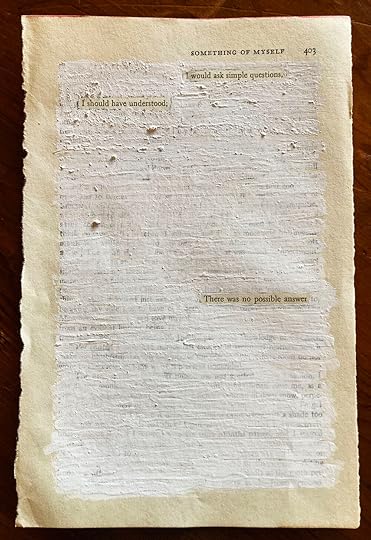
I would ask — an erasure poem by Drew Myron
1.
Make something.
Make up, make do, make coffee, make love, make art, make the bed — make something.
2.
Lonely seeps.
Some days, even the bright ones, the soccer net sags, the sun leans into the grass with a sigh, even the trashcan stands askew.
I am loping along an abandoned track when the cool morning air turns my watering eyes to full sob for a brief moment for no real reason. Isn’t there so much loneliness to these days of getting through?
We’re all doing the best we can. Of course, of course, of course.
Make do, re-do, getting through. We’re all doing doing doing.
It’s the endlessness that wears.
3.
Poetry is medicine.
“I’ve been thinking about how poetry can sustain us,” says doctor-poet Rafael Campo, who treated patients during the height of the AIDS crisis and is now treating Covid-19.
“We need poetry now as we did then to make sense of our experience of suffering.”
4.
Write through.
What to do? Write through.
“It’s like often nothing happens when you stay still. I always feel like I write something out of a transition of some sort,” says writer Eileen Myles.
“You know, like, coming into my apartment thinking: Another day in which I haven’t done any writing. And then that thought fills me with anxiety and I walk in and I write something. . . . I mean, a poem is just a list. It’s a kind of sharing. It’s just an exploration of the filing system of your brain as it moves through space and time.”
5.
From now on . . .
Today is the day, I say.
I often make these sort of statements. I think I’m making conversation but my husband calls them “proclamations,” then asks, “Are you telling me or telling yourself?”
I’m almost always telling myself.
Like this blog, equal parts confession and cheer. So here’s my proclamation to the world (and mostly myself):
Let’s make something!
But let’s not go alone. Please join me. What are you making?
Share your words, art, poems & proclamations with me: dcm@drewmyron.com
September 30, 2020
Fast Five with Robert Jackman
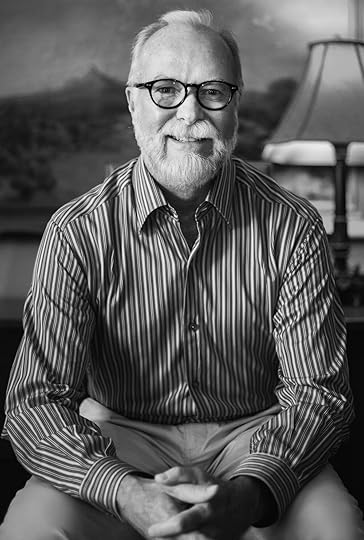
"The perspective we take has the potential to expand us into love, or contract us into fear.”
— Robert Jackman
Welcome to Fast Five, in which I ask my favorite writers five questions as a way to open the door to know more.
Robert Jackman is a psychotherapist who combines principles of mindfulness, hypnotherapy and spirituality as paths to healing. He has a private practice in Chicago, Illinois, restores his spirit in the coastal village of Yachats, Oregon, and is the author of Healing Your Lost Inner Child.
If ever we’ve needed a voice of calm reassurance and authentic peace of mind, the time is now. Please welcome Robert ‘Jake’ Jackman:
1.
After working for years as a psychotherapist, what prompted you to now write
Healing Your Lost Inner Child
?
I wanted to write the book for years but a part of me was apprehensive and my latent inner child wounds of not feeling good enough kept creeping in to stop the process. Then in December of 2019 I heard an interior voice say very emphatically, it's time to write the book now! Once I started to write, the flood gates opened and the manuscript developed very quickly. Gone were any of the apprehensions and now I couldn't wait to see my book in print. The material kept coming and after I sent my manuscript to my editor I still had more content that wanted to come through and that's how the Companion Workbook was born.
2.
I really appreciate your "homework" approach as a way to utilize practical tools for inner work. What key advice would you offer those working on personal growth?
For anyone considering looking at themselves introspectively remember that it takes a great deal of courage to be vulnerable. The most important advice I give people going on a journey of self-exploration and therapy is to know that they will get as much out of the process as they put into the process. The secret is to begin to listen and not be afraid of the voice coming from the shadow world of the subconscious. So much is stored within and many people push this away thinking that their own truth will swallow them whole. The other piece of advice is to trust in yourself and the wisdom you carry. Therapists are just mirrors reflecting back a person's wisdom. Too often we doubt our greatness and make ourselves smaller. You are stronger than you think.

3.
What books — or people — have influenced your professional life, and how?
Carl Jung and his lifetime of work specifically his wisdom regarding the subconscious and archetypes.
Louise Hay, author of You Can Heal Your Life. She was such a bright soul and her kind and gentle presence lives on in her words. Through her work I learned how to transform trauma wounding experiences from diminishment and sorrow to loving messages of healing and encouragement.
Michael Newton, author of Journey of Souls. His books have helped to expand my understanding of energy and life. Reading his books greatly influenced my understanding of metaphysics and helps me to rise above the fray and not be mired in the fear-based illusions that always seem to be presented to us. His work and my study of metaphysics in general have helped me gain a larger perspective in which to see the world.
4.
In these difficult days, what keeps you going?
Knowing and trusting at a deep level that this too shall pass. To deeply understand that the perspective we take, that which we are in control of, has the potential to expand us into love, or contract us into fear. When I'm inspired and have a quiet moment, I will make an intention of beaming love to everyone on the planet who may be at that time in some state of fear. My intentional meditation and trust in the unfolding events centers and calms me. And, having survived a near-death experience where I experienced waves of undulating infinite love and the resonance of a serenely deep calm with no knowledge of time, instantly calms me when I connect to this part of my memory.
5.
I'm a word collector, and keep a running list of favorite words. What are your favorite words?
erudite, magical, ephemeral, and magnanimous
Bonus Question:
What are some common things that most people do that create a great deal of stress in their lives?
Number One: Making up Stories
This is a fear based projection most people use when they haven't gotten the answer they want or they have not heard back from someone for example. We all do this and too often we make up the wrong story and then we start to believe our made up story as a fact. This pattern tends to create a lot of stress within people and is avoidable.
Number Two: Giving Power Away
When we give power away to others we lose agency within ourselves. Making others greater than, and ourselves less than, perpetuates the false illusion that we are not worthy which then creates a cycle of victimhood. This perpetuates the idea that for some reason we are not deserving of love.
Number Three: Having Unrealistic Expectations
When we project an expectation into our future we are setting ourselves up for a potential disappointment. It's almost impossible to not have expecatations and the trick is to transform the expectation into a hope or intention. We still may not get what we want, but the sting won't be as bad.
To know that we all screw up, but remember whatever decision you made that you now regret, at that moment in time it was the best decision to make based on everything you knew about yourself and life at the time. Be gentle with yourself, earth school is hard enough.
September 22, 2020
Paint + Poem = POW!
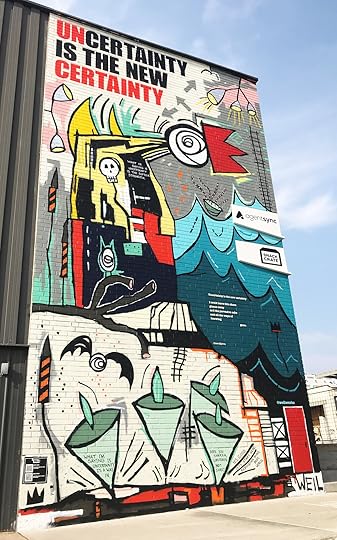
I got CRUSHED and I’m thrilled about it!
Artist Tracy Weil and I teamed up for a painting + poetry collaboration now splashed across a tall office building in Denver, Colorado.
CRUSH is a week-long celebration of graffiti and street art in Denver, Colorado. Every September, nearly 100 artists take over a 30-block area in the RiNo Art District, creating larger-than-life murals for all to enjoy.
The annual event was founded in 2010 by Denver artist Robin Munro. Artists create vibrant and lively works for this free-to-the-public outdoor gallery. This year organizers received over 700 artist applications.
"The essence of Crush is to create a censor-free platform for artists, and for them to get paid for their work while doing it," says artist Tracy Weil, co-founder and head of the RiNo Art District.
There is great power in partnership. In collaboration, perspective shifts. A painting deepens, a poem grows. Meanings merge and boundaries enlarge to create a work broader than the initial singular start.
Uncertainty is the New Certainty is located at 2700 Walnut Street in Denver, and will be available to view for the next year.
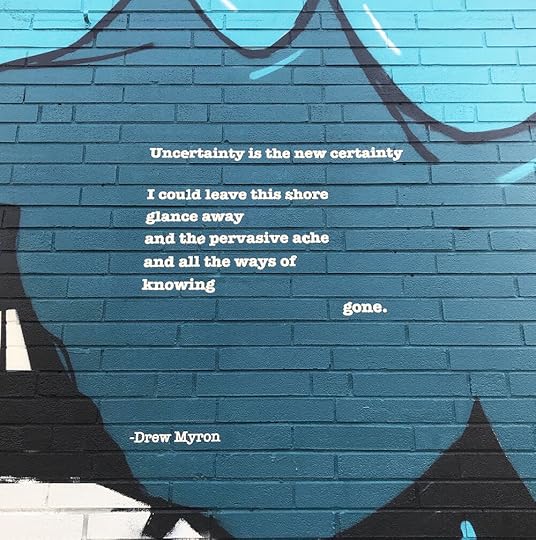

See More Tracy & Drew Collaborations:
Where Art Is Made - RiNo Art District - Video Poem
Forecast - painting & poetry exhibition and book
The Making of Dust - art & poetry exhibition
September 14, 2020
Why Bother?

Is this a turning point, which is to say a breaking?
Nearly everyone I know is slogging through a bog of exhaustion, mind and body weighted with worry: how to live in pandemic, in propaganda, in deceit and hate, in flames and flood, in hurricane and heat?
I wish this were metaphor.
There's a lot of why bother, because to be bothered is to be worn away. Aren't we all just so tired?
What’s your strategy, what keeps you going? I keep doing the things I know best: eat, sleep, read, write, soak. Bath as balm. Book as solace. Food as drug. Writing as necessity.
We are the secretaries of the heart, writes Susanne Dubroff.
And so we write — letters, lists, poems and dreams. Writing against clamor and conversation, out of sludge, into silence. I keep writing, to you, to the gone and going, to no one and every one. Hear me, hear me, here in the corner huddled, here in the door waving, here in the car moving forward in the only way I can.
Words are paths to emotional sovereignty, writes David Harris.
I keep reading. Looking for myself, for wisdom and path, for distraction and delight, for you in the galley, in the gutter, in the page’s last dash. There is a tap-tap-tapping in my head: keep on, keep on.
Eyes blur, pen drags, night arrives early. And yet we write on and on. Like breath, we cling and clutch and reach for more. These words, these words, blanket and balm, seekers of heat and life, of rest and renewal. These words, hang on necks and creak through fingers. These words are not much but all we have and everything we need.
Why Bother?
Because right now there is someone
Out there with
a wound in the exact shape
of your words.
September 10, 2020
Fast Five with Rosemerry Wahtola Trommer
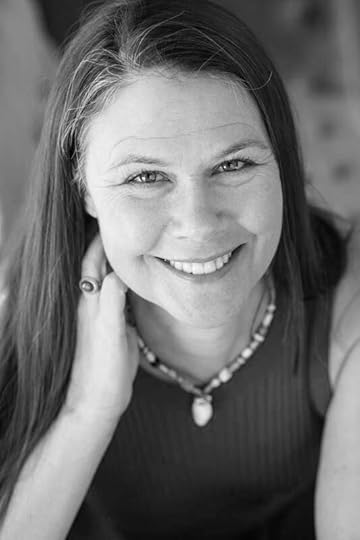
"The poem is not the point; the poem is simply the byproduct of showing up to be wrestled by the world and by language.”
— Rosemerry Wahtola Trommer
Welcome to Fast Five, in which I ask my favorite writers five questions as a way to open the door to know more.
Rosemerry Wahtola Trommer is the author of 12 poetry collections and her work has appeared in O Magazine, on A Prairie Home Companion, on fences, in back alleys, and on river rocks she leaves around the banks of the San Miguel River near her home in southwest Colorado.
She served as San Miguel County’s first poet laureate from 2007 to 2011 and as Western Slope Poet Laureate from 2015 to 2017, and teaches and performs poetry for addiction recovery programs, hospice, mindfulness retreats and more.
An advocate of the power of practice, Rosemerry has written a poem every day since 2006.
1.
For nearly 15 years, you've written a poem a day, and shared it on your blog. Can you tell us about your process?
I write at night, usually, after everyone has gone off to their own quiet space in our house. And I sit with a blank page and I wait to see what happens. If it stays blank a long time, I start to sift for ideas. I might look around the room and let my eyes land on an object. Or think about an interaction from the day. Or I might read poems and find something in them that thrills me and then give myself a prompt based on a line or an idea. Or I might read the news. Or look at an image. Or think of someone I want to write a letter . . . so many ways to begin a poem!
I don't feel pressure to produce, but I do feel the ever present invitation to practice — which feels fundamentally different to me as a motivation. The poem, ironically, is not the point — the poem is simply the byproduct of showing up to be wrestled by the world and by language. The point is the showing up and, as Rilke said, the “being defeated decisively by constantly greater beings.” That’s why I write every day. It changes everything about who I am and how I meet the world.
2.
Who has influenced your writing life?
So many people! Today the first who comes to mind is Art Goodtimes, a paleo-hippie, fungi obsessed, potato-growing wild man poet. When I first moved to Telluride in 1994, he said, “Give me some poems.” And I shared a few and he said something like, “These are nice. I wonder what would happen if you relaxed?”
Wonderful advice. I was writing such tightly wound, cryptic poems. And it was a revelation, too, to watch him perform—he used his whole body and his whole vocal range of volume and intensity. I remember staring at a picture of him with his arm raised while reading a poem and I thought, “How does he do that?” And so I began to experiment . . .

Perhaps most importantly, Art introduced me to a poetry community—sitting in a circle, passing a talking gourd, listening to each other. It was so different from the red-pen-stained critique circles I’d been in before. This community was intent on listening, really listening to each other. Not to point out what was wrong with each other’s poems, but to hear the humanity inside them. I am so crazy grateful for Art, who has been my partner in teaching and organizing and performing and human-ing for 26 years.
3.
What advice would you offer new or struggling writers?
Something I once heard David Lee say: "Surround yourself by writers who are better than you are."
4.
I'm a word collector, are you? What are your favorite words?
sometimes
(So symmetrical! An s on both ends, then a vowel, then an m, with that slender cross of the t in the center, ah!! Because of my passion for this word, when I was in 8th grade my priest gave me a book of e.e. cummings poetry for confirmation, a gift that opened my eyes to what poems might do.)
perhaps
(I love the softening effect it has on anything that comes after it.)
blossom
(Both the verb and the noun—this word is like a magnet. I have to force myself not to use it all the time, but it always seems like exactly the right word to me.)
yes
(Perhaps I love using this word too much.)
and then a host of single syllable Anglo-Saxon-ish words with punch, such as wretch, flunk, slink, scum, wreck, spook, scram, splat, pluck, plunk, scrap, fluke, snatch . . .
5.
In the difficult days, what keeps you going?
Morsels of beauty & scraps of joy: The scent of the river. Falling off my chair at dinner because I am laughing so hard. Sunflowers in the garden. Erik Satie. Poems by James Crews. Sitting under the stars with friends. Walking alone in the woods. I follow these moments like a crumb trail. Devour them. Sniff for the next crumb.
Bonus Question: What has changed about your process?
My relationship to the blank. A white page used to scare me, stare me down. Now it feels like an encouragement to step into infinite potential. Every time I sit down with a blank, I wonder what might happen. Something!
• Buy Hush, Rosemerry’s latest book here.
• Learn more about Rosemerry:
TEDxPaonia
Rattle Magazine Podcast



